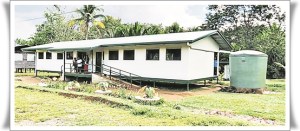
Education initiatives in Western
This report from the PNG Sustainable Development Programme Ltd tells of the new phase it works with the Fly River government and other partners to complement and supplement services in Western in an effort to provide lasting benefits for the people.
EDUCATION has been an important priority for SDP (Sustainable Development Programme) because of its firm belief that good schooling is the pathway to a better future.
To this end, SDP has been investing to improve school infrastructure, funding school fees, and using modern technology to support teachers and students in the classroom.
It is also funding the development of a Balimo campus, initially as a Fode (flexible open distant education) centre with 105 enrolled students but soon to be a tertiary institution for training teachers and health workers.
During a recent visit to Balimo, SDP staff caught up with Rosita Galowa, a grade 12 social science student.
When asked how things were going, she responded saying: “Classes in the Balimo campus are going well.”
“Everyone’s really busy and are looking forward to the exams in November,” she said.
“I usually go to sleep in the early hours of the morning after completing all my assignments.
“I want to do well for myself and for my two children.
“My family has been very supportive, and I am very grateful.”
Galowa said one of her highlights was listening to their local member and education inspector talk about the importance of having more local teachers and health workers in the district.
“When we heard that, we were encouraged to push forward and complete our studies, get into teaching and community health work so we can serve in our own district and province,” she said.
Galowa said one of her friends had been considering withdrawing from school, but she kept on encouraging her by saying this was a wonderful opportunity for them all to build a better life.
“I reminded her of how understanding our principal is. That he allows us to bring our children to school so we can have them sit or play outside while we study,” she said.
“I found this very helpful personally, and now my friend does too, enabling her to remain in school. I am happy.” The Balimo project is funded by SDP and managed by Kokoda Track Foundation.


SDP is also paying project fees for school students throughout Western.
The money is for much-needed equipment, supplies and facilities, not to pay for administration or staffing.
The head teacher of Kwiroknai Primary School, Jonathan Kolda was very excited to show SDP the teacher’s house that they had built using last year’s funding.
“We want to thank SDP for this initiative as now we are able to provide housing for one of our staff,” he said.
“The house came with a water tank.
“This year’s funding is going towards purchasing toilet pots and a few more tanks for the other staff houses.”
Kolda added that he was grateful for the SDP funding which will enable Digicel Foundation to build a new double classroom, which comes fully kitted with a water tank and toilet and bathroom facilities for his school. “The community is excited. Land has been cleared, and we are all looking forward to the start of construction very soon,” he said.


This school infrastructure project, education projects igniting change (EPIC), is being implemented by SDP’s partner, Digicel Foundation in Western, with the aim of increasing numeracy and literacy.
Digicel Foundation CEO Serena Sasingian said: “We are proud of the EPIC Schools project in Western Province that has enabled us to build 40 double classrooms plus one staff house.
“From our experience, we know a conducive learning environment goes a long way towards improving educational outcomes.
“Our work would not be possible without our dedicated team of contractors who work on the front lines to deliver critical community infrastructure.
“Some of the schools where we are building classrooms are located in the remotest parts of the province.
“This allows us to live up to our motto ‘leaving no one behind’.”
The head teacher at Rumginae Primary School, Tanato Mulake, who is the only female head teacher in the district, was delighted to show SDP and Digicel Foundation the classroom that was built for them last year.
“We have our grade eight students in there and can see how this has been a boost to their studies as they prepare for exams at the end of the year,” she said.
The whole school is also benefitting from the water tank, and toilet and bathroom facilities that came as part of the project.
“A lot of schools do not have these facilities; we are privileged and thankful for the support we are receiving from SDP.”
Rumginae Primary School has also been chosen to participate in the e-learning programme that is being funded by SDP for the lower primary students.
“I believe this project could also be beneficial to the grades seven and eight students in terms of having access to the online reading materials,” Mulake said.
“The three-day training session that the teachers participated in two months ago is not enough.
“Some teachers and students in remote areas have never used a computer before that starting off with a tablet is quite daunting.”
The e-learning programme is targeting 9,000 students in 38 schools spread across Western province.
Some 200 teachers are trained in using this technology in the classroom to set tasks and monitor student performance.
This initiative is testing an exciting innovation aimed at improving student numeracy and literacy by using the latest 4G telecommunications and internet technology to support the existing education system.
It is being funded by SDP and implemented by its partners, Digicel; Save the Children and Inclusiv.
- For more information, contact: Esther Sibona, director of communications via email on [email protected]